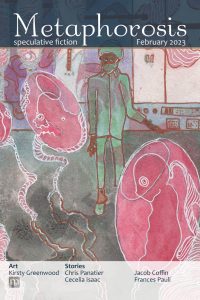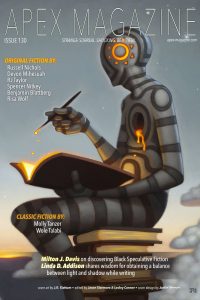Caren Gussoff Sumption Reviews Juniper Wiles and the Ghost Girls
 Juniper Wiles and the Ghost Girls, Charles de Lint (Triskell Press 978-1-98974-106-1, $15.99, 264pp, tp), November 2022.
Juniper Wiles and the Ghost Girls, Charles de Lint (Triskell Press 978-1-98974-106-1, $15.99, 264pp, tp), November 2022.
I’m well aware that calling something a ‘‘beach read’’ holds negative connotations – but in the case of Charles de Lint’s second installment in his Juniper Wiles series, Juniper Wiles and the Ghost Girls, I mean to call it a beach read in a more literal, delicious way. This book, which stands alone but gains richness when read after the first in the series, is sunny, breezy, and fun, combining elements of some of the urban fantasy genre’s most beloved tropes into a relaxing, untaxing read. If you are in the mood for a quick escape, Juniper Wiles and the Ghost Girls is an immersive delight.
Juniper, the main character, is – in my opinion – immediately likable. She’s acerbic, for sure, and more than a little reluctant to embrace her new role as supernatural private eye. Not just because she made her fortune playing this same role in a wildly popular television show, but because she simply isn’t sure, yet, who she wants to be in this new phase of her life. She’s fresh off a death-defying adventure (in the first book, Juniper Wiles), and really just wants to settle into life in Newford, living in the house she grew up in, along with her brother, Tam, and her beloved dog, Sonora. But Newford isn’t your average city, and Juniper’s closest friend, Jilly Coppercorn, is gung ho on the prospect of helping others (Jilly lives in an unofficial commune of artists with magical interests, and spends much of her time volunteering in non-magical ways around the community). And though it’s never said outright whether Jilly’s magnetism has any supernatural origin, people around Jilly tend to do – with joy – what Jilly wants. So, ready or not, Juniper finds herself consulting with the Newford police department’s Paranormal Investigations division on a case involving a cursed box (which is also haunted by the attached, titular ghost girls) and assisting a fictional character made real by belief in his search for his missing sibling.
If this is sounding like the Dresden Files or, even, recalls episodes of Angel, then you are far from alone or incorrect. De Lint doesn’t shy away from his inspirations, and, himself, calls attention to the fact that the story was birthed as part of a Hellboy project (and includes the Hellboy bonus short at the end).
Since this is a PI novel, at its heart is a mystery that needs to be solved. There are, as mentioned, two of them, but the trapped ghosts, who only Juniper, with her ability to see the dead, can interact with, dominate the book. Since the ghosts’ voices have also, somehow, been taken or bound with the box, and the only way to communicate with them is via a dangerous magical item that drains life force and allows the ghosts the ability to take over a body, unraveling who the girls were and what happened to them takes the majority of time and attention.
De Lint populates the world well with allies and friends of Juniper and Jilly, who not only add roundness and color to the world, but, of course, possess powers which frequently come in handy (occasionally, just in the proverbial nick of time). There’s Christiana, born of shadow remnants, who can construct places – and doorways to such places – that are out of time and space. Joe is a ‘‘cousin,’’ from the race of shapeshifters who have lived on the planet longer than even humans. Geordie, Jilly’s spouse, has connection and standing within the fairy/seelie courts. Even Duncan, the fictional character who sought Juniper’s help, along with his brother, Davey (once the gently-treated subplot that solves Davey’s disappearance is unraveled) are wizards, academically trained at an academy not unlike some other familiar one which I shall not name.
This isn’t to say that characters with no magical ability are given short shrift. Commune artist Saskia assists greatly with her research prowess, while Wendy, another roommate of Jilly’s, is invaluable as a fan of the book series which birthed Duncan and Davey. Even the police detectives, Cray and Nash, though their portrayal veers wildly close to the worst versions of police clichés around, prove to be useful allies.
Overall, the pace is fast, the plotting is, in most parts, tightly controlled. It can be a bit confusing to keep character names straight, particularly at the frenetic climax (while the big bad is, admittedly, a bit of a let-down, the fight scene has all the drama and danger it deserves), and there are a few, small throw-away plotlines (we definitely do not need the unfleshed-out, halfhearted demise of Juniper’s current dating relationship, for example). And while Juniper Wiles and the Ghost Girls does little to push beyond its various, obvious inspirations, the book is charming in its familiarity. It’s a world similar to many others, but pleasant and comfortable – and, within that, it finds its own niche.
Caren Gussoff Sumption is a writer, editor, Tarot reader, and reseller living outside Seattle, WA with her husband, the artist and data scientist, Chris Sumption, and their ridiculously spoiled cat-children.
Born in New York, she attended the University of Colorado, the School of the Art Institute of Chicago, Clarion West (as the Carl Brandon Society’s Octavia Butler scholar) and the Launchpad Astronomy Workshop. Caren is also a Hedgebrook alum (2010, 2016). She started writing fiction and teaching professionally in 2000, with the publication of her first novel, Homecoming.
Caren is a big, fat feminist killjoy of Jewish and Romany heritages. She loves serial commas, quadruple espressos, knitting, the new golden age of television, and over-analyzing things. Her turn offs include ear infections, black mold, and raisins in oatmeal cookies.
This review and more like it in the February 2023 issue of Locus.
 While you are here, please take a moment to support Locus with a one-time or recurring donation. We rely on reader donations to keep the magazine and site going, and would like to keep the site paywall free, but WE NEED YOUR FINANCIAL SUPPORT to continue quality coverage of the science fiction and fantasy field.
While you are here, please take a moment to support Locus with a one-time or recurring donation. We rely on reader donations to keep the magazine and site going, and would like to keep the site paywall free, but WE NEED YOUR FINANCIAL SUPPORT to continue quality coverage of the science fiction and fantasy field.
©Locus Magazine. Copyrighted material may not be republished without permission of LSFF.







